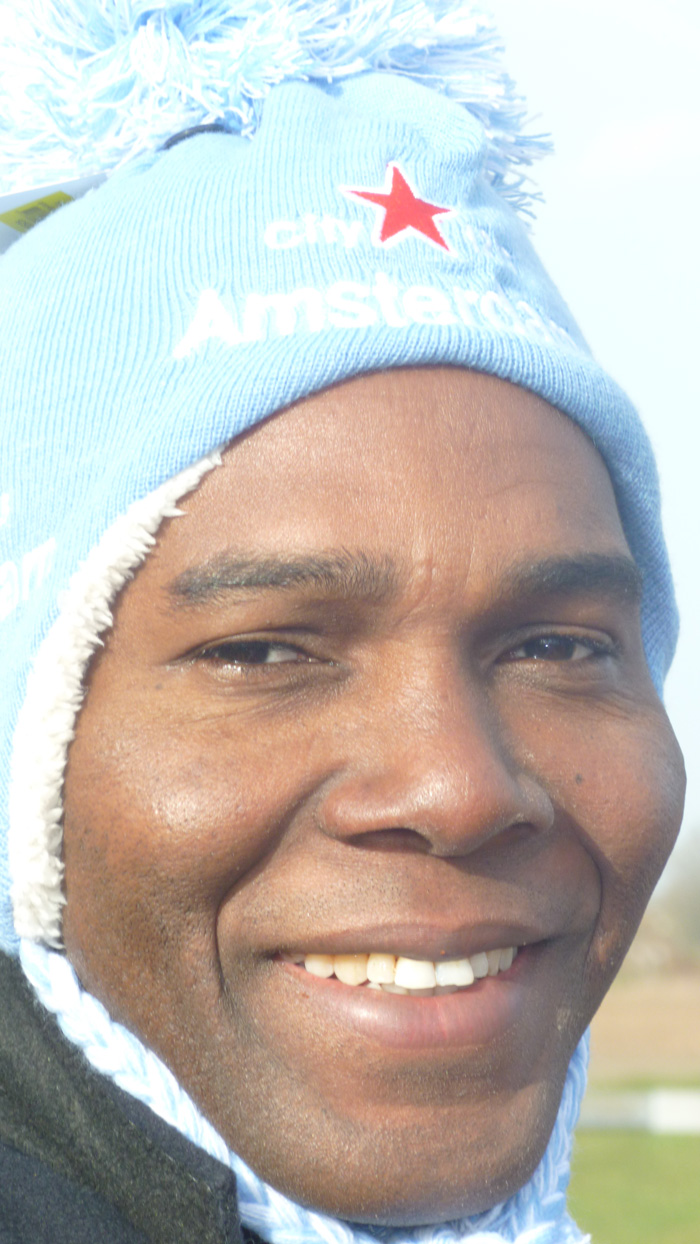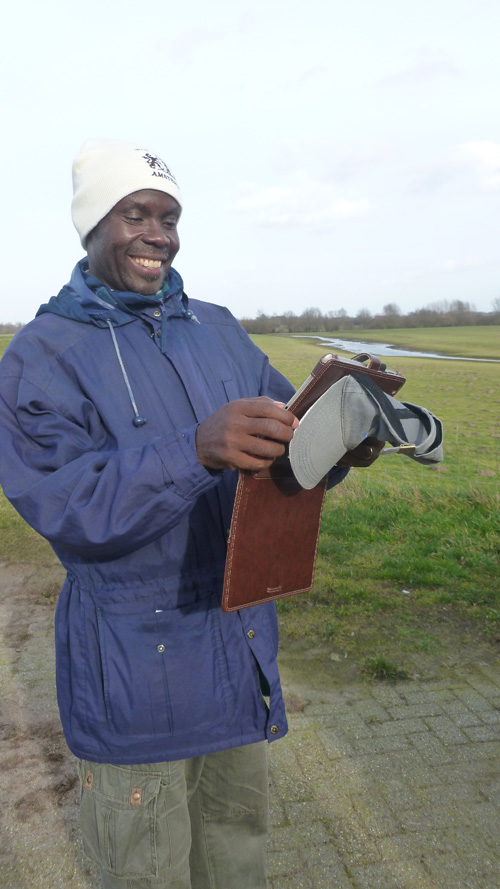Africa on the Dutch IJssel River
“I will not go!” Sena Alouka yells in the bus along the highway as we pass a desolate farm that is totally surrounded by bulldozers and soil that has been turned and ploughed. A familiar sight for most of the riders in the bus, which includes nine Africans, an Indonesian and a handful of Dutch people. Evictions and land expropriations are an almost daily occurrence in Africa and Indonesia. And then the whole group spontaneously chants: “I will not go! We will support you!”
Room for the River
It is 6 February and we are on our way to Voorst where we are going to take a look at the “Room for the River” project near the IJssel River. Sena Alouka, director of the environmental organisation JVE Togo, like the rest of the group, works on sustainable water management and the fair distribution of water in his own country. The group’s members work together with communities that all have vivid experiences of losing their livelihood when they’re suddenly faced with the fact that there are no more fish left in the river; or when the river just totally vanishes, leaving nothing to fish in; or when they discover their land and homes under water. Flooding sometimes also occurs in the Netherlands and so we are also going to see how this issue is tackled here.
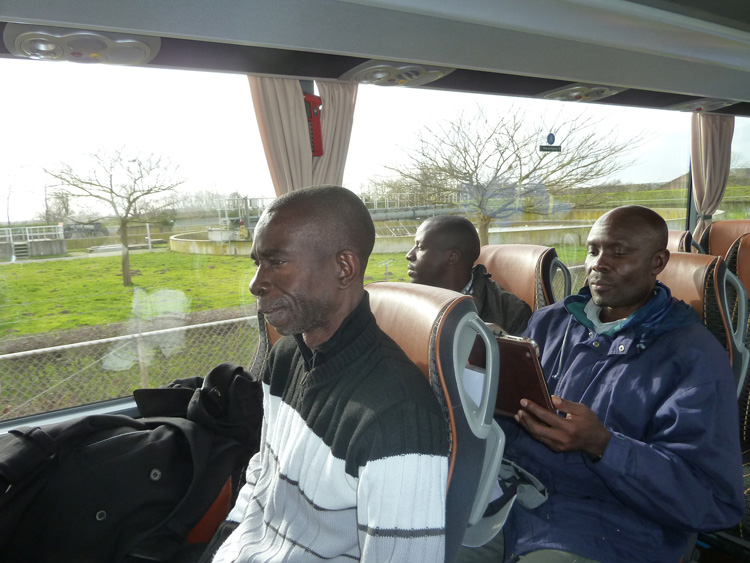
Mame Latyr Fall (Forum Civil Senegal) , Dickens Kamugisha (AFIEGO Uganda), Robert Kugonza (NAPE Uganda)
Contributing to the thinking process
The involved partners all know from years of experience how difficult it is to manage water supplies and rivers in a sustainable manner and how important it is to get all of various water users (those from the neighbourhood, farmers, businesses) involved. Plans drawn up and subsequently adopted by the authorities without local consultation are pretty much doomed to fail. It is only when ideas involve the input of everyone involved and their ideas are taken seriously that one and all will sufficiently feel responsible for the success of a particular project. The magic words in this case are “participatory water management”. But our partners want to take this further: not only do the participants involved have to approve the plans but they also need to work together during the development phases.
Top-Sector Water
This method, which is called the “Negotiated Approach”, has already produced some positive results in various river basin areas around the world. Both ENDS, together with the above-mentioned African and Indonesian partner organisations, have been very active in introducing this method into practice in the regions these organisations focus on. This, however, will only succeed if local and national governments support it, and the Netherlands can potentially play an important role in this regard. The Netherlands has designated water as one of its top sectors for serious involvement. We Dutch people know better than anyone about the need to harness water and this knowledge is something we are more than willing to export.
|
|
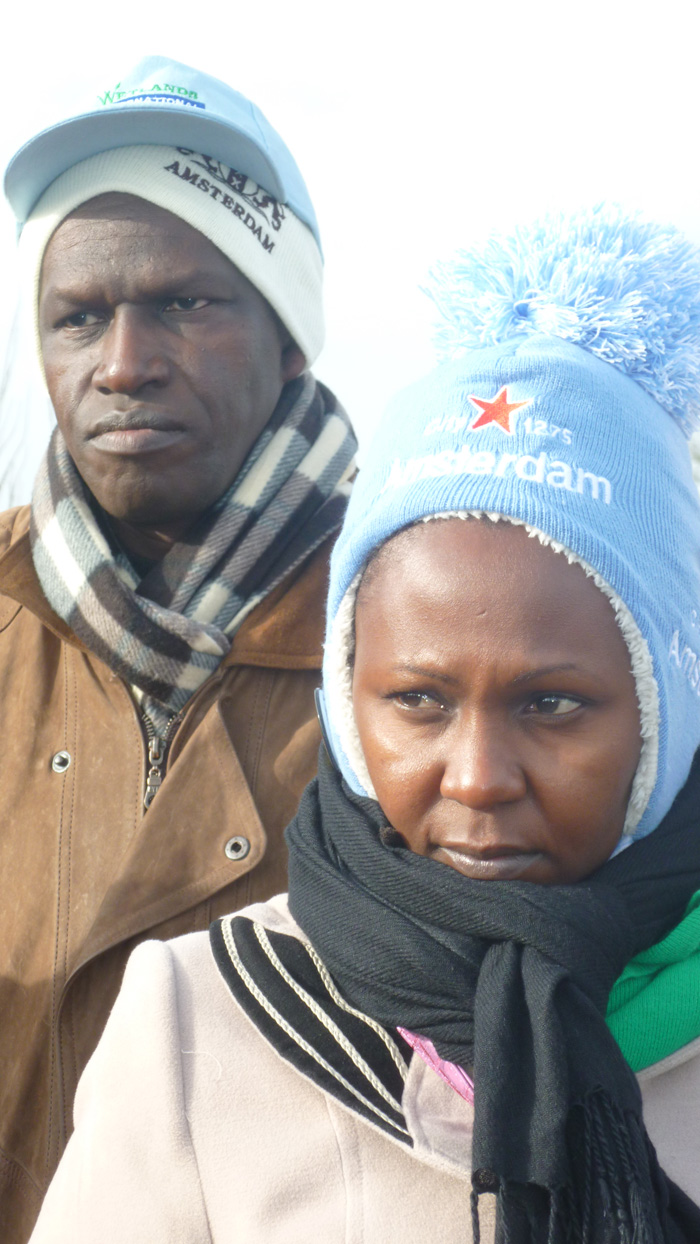 |
|
||
| Sena Alouka (JVE Togo) | Serah Munguti (Nature Kenya) and Papa Wawade Wade (Wetlands International Senegal) | Robert Kugonza (NAPE Uganda) |
However, we should not limit it to our technical knowledge; we should also be willing to export our water management “software”, which includes our experience with the consulting and negotiation processes, as well as our “polder model”. When it comes to water management, “software” is just as important as “hardware”. This became very clear during a recent luncheon reading organised by Both Ends on 5 February 2014 at the Ministry of Foreign Affairs, where two of our partners gave a presentation. By discussing their practical experiences in both Kenya and Togo, they were able to present a very powerful message.
Back to Voorst
Once we had arrived at the Water Board in Voorst we quickly saw with our own eyes the problematic nature of water along the IJssel. It is also became instantly clear how totally different the Dutch and African realities actually are. “How many homes end up under water here?” Serah Munguti of the Nature Kenya organisation asks the spokesperson giving us the tour of the project.
“For this particular part of the project we will need to evacuate about eight families.” Our guests stare at him in amazement. In other words, all this effort for just eight families? In Africa or Asia, a similar situation quickly means hundreds of victims. Moreover, the devastation these people experience largely goes uncompensated or under-compensated at best.
“And how much compensation do these families receive?” Munguti inquires.
“Enough to purchase a new farm, move all their belongings and start from scratch again.”
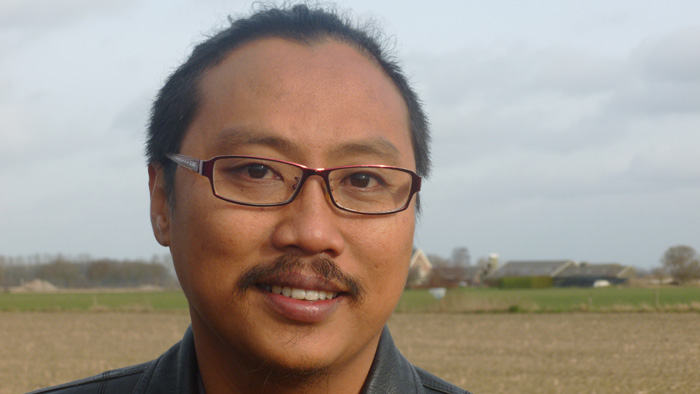
Prigi Arisandi (Ecoton Indonesia)
Prigi Arisandi, from Ecoton, an Indonesian organisation, is also very impressed. “We are already happy when the local government, after years of resistance and protest, finally relents and accepts responsibility for the quality of the water in our river. The issue of preventing flooding in Indonesia in the future has thus far remained unaddressed.”
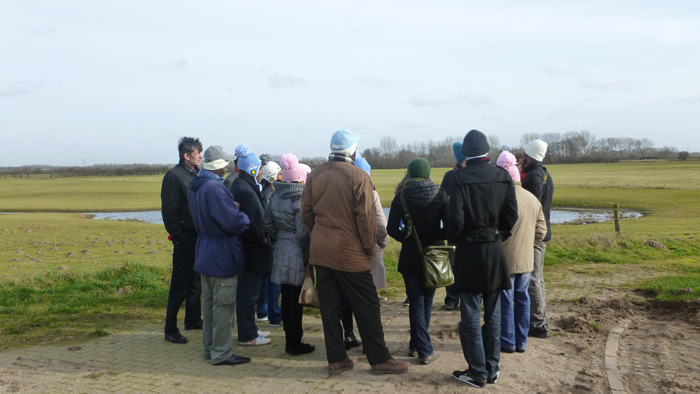
Readiness does not cost anything
It is obvious that the Dutch model can never be transferred directly on a one-to-one basis in Africa, Asia or Latin America. In the Netherlands, they make plans for the very long term and plans are only developed after extensive studies have been performed. Meanwhile, non-Western countries tend to more readily operate in an ad hoc manner. That is not something one can change in a day. But negotiating, listening to people with practical experience, understanding one another’s point of view, considering the various interests and collectively arriving at a compromise, are certainly details that fit into many other realities than just our Dutch context. This means, first and foremost, that consciousness-raising, support and preparation are of particular importance. This is something our guests hope to take back with them from the Netherlands.
More information:
Cases and experiences of our African partners
Video about the Negotiated Approach in India and Africa
Read more about this subject
-
 Event / 11 March 2025, 09:30 - 11:15
Event / 11 March 2025, 09:30 - 11:15The Conflict, Gender, Climate Nexus: Localized understanding and policy recommendations
Across the world, women lead efforts to advance peace, gender and environmental justice. From the Philippines to Mozambique, Burkina Faso to Brazil, they face a deadly convergence of violence, environmental destruction, and extractivist land grabs. As corporate interests, state forces or other armed actors expand into their territories, entire communities are displaced, criminalized, or subjected to violent repression. At the same time, worsening…
-
 News / 4 March 2025
News / 4 March 2025Feminist March 2025: let's take to the streets for gender justice
Women's rights are under pressure worldwide, and hard-fought rights and freedoms are being dismantled. Whereas until recently the Netherlands was a champion of emancipation, women's rights and gender justice, the current cabinet is breaking with this policy and abandoning millions of women and girls. That is why Both ENDS, together with many other allies, will be taking to the streets on 8 March. It is time to make a strong stand against the…
-
Letter / 3 March 2025
Input for FMO’s “investment approach to responsibly managed forest plantations”
Both ENDS has been asked by FMO to comment on its draft investment approach to responsibly managed forest plantations. To follow are a number of observations and recommendations, partially informed by Both ENDS long legacy of working in the forest & land arena, in dialogue with international donors, philanthropic foundations, companies, certification bodies and notably with forest dependent communities and other land users.
-
 News / 21 February 2025
News / 21 February 2025Cabinet turns its back on international cooperation and solidarity with callous policy letter
Foreign Trade and Development Minister Klever's published policy letter is coldhearted and callous. It places the Netherlands in international isolation…
-
 Press release / 18 February 2025
Press release / 18 February 2025Trade deal fueling resource grab? 120+ groups from Europe and Indonesia sound the alarm
Brussels, 18 February 2025 - Over 120 civil society organizations and trade unions from Indonesia and Europe today call on the Indonesian government and the European Union to stop the negotiations for the Indonesia-EU free trade agreement – the Comprehensive Economic Partnership Agreement…
-
 Dossier /
Dossier /Seeking justice for the affected communities of Vale’s mining disasters in Mariana and Brumadinho
In 2015 and 2019, the Brazilian state of Minas Gerais experienced two severe mining tragedies in Mariana and Brumadinho, due to the same mining company: Vale. Since then, the affected communities have been seeking justice, via the criminal punishment of the responsible parties, and a fair compensation for the loss of their loved ones, their homes and their livelihoods. Both ENDS supports local CSOs by amplifying their quest for justice within an international audience and, more specifically, by raising awareness amongst Dutch investors in Vale about the high risks this company’s…
-
 Dossier /
Dossier /Towards a socially and environmentally just energy transition
To address the climate crisis we need to urgently transition away from fossil fuels towards clean, renewable energy. However, this transition is not only about changing energy sources. It requires an inclusive and fair process that tackles systemic inequalities and demanding consumption patterns…
-
 Blog / 30 January 2025
Blog / 30 January 2025Brumadinho’s painful “seas of mud”
By Carolina de Moura
Six years ago, Brumadinho tailings dam I, from the Paraopeba Complex, owned by mining company Vale, collapsed. January 25th, 2019, forever changed the lives of thousands. The scars remain open, and the quest for justice, remembrance, and prevention of future mining crimes endures despite all adversities. This was manslaughter coupled with socio-environmental devastation of proportions difficult to measure. These are irreparable losses and damages that could have been avoided if it wasn’t for the greed, negligence, and irresponsibility of decision-makers at Vale, the German…
-
 Blog / 28 January 2025
Blog / 28 January 2025Sinking promises in Manila
Yesterday, Global Witness published a new report, "Sunk Costs" - in which I had a modest role to play - that comes up with new facts about the disastrous New Manila International Airport project in the Philippines, for which the Dutch dredging multinational Boskalis received Dutch export credit…
-
 News / 22 January 2025
News / 22 January 2025 -
Publication / 16 January 2025
-
 News / 16 January 2025
News / 16 January 2025DetoX: Both ENDS leaves X
Both ENDS, along with many other Dutch organisations, is leaving social media platform X. In January, we will join the campaign ‘#DetoX’ by De Goede Zaak and Stem op een Vrouw. We hope that many organisations will follow us so that the hate, misinformation and the undermining of democracy on…
-
 News / 13 January 2025
News / 13 January 2025New partnership with Netherlands Enterprise Agency for resilient food systems in Sahel
The situation in Africa's Sahel is the world's fastest-growing humanitarian crisis. Over 3 million people are fleeing violence. They are ravaged by hunger, disease and increasing drought caused by climate change. Both ENDS and its partners are successfully working on accelerating the resilience of local food systems and communities in the Sahel, based on ‘Farmer Managed Natural Regeneration’ (FMNR). The project, funded by DOB Ecology, will end…
-
 News / 24 December 2024
News / 24 December 2024LILAK's Dare to Trust projects: Dreams transformed into actions
LILAK has worked alongside indigenous women communities for over a decade, focusing on building capacity and advocating for rights to land, the environment, and bodily autonomy. Despite gaining recognition and trust from allies, the journey was challenging. Starting with limited resources, LILAK faced resistance, particularly from patriarchal leaders and the state, which often labeled them as adversaries. Nevertheless, they adapted and…
-
 News / 24 December 2024
News / 24 December 2024Dare to Trust: a journey of culture, renewal, and empowerment of Sengwer women
Historically, the Sengwer community has lived in harmony with their environment, relying on forest resources for sustenance and integrating conservation into their daily lives. However, recent government policies aimed at forest protection have limited their access to these ancestral lands. Although these regulations intend to protect the environment, they often disregard the traditional conservation practices of indigenous communities like the Sengwer, who have been natural stewards of these lands for generations. Faced with these restrictions, the Segerger Women’s Conservation…
-
 News / 24 December 2024
News / 24 December 2024Forum Suape empowers women's groups with Dare to Trust-grants
Forum Suape decided to help several women’s groups in their network. First, they wanted to understand the desires and needs of each group, with the aim of fostering collective thinking and understanding their collective interests and goals. Five groups were selected, one group had difficulty in…
-
 News / 24 December 2024
News / 24 December 2024Dare to Trust: Sowing dreams irrigated with droplets of trust (Colectivo CASA)
Collectivo CASA in Bolivia, with support from Both ENDS and Dare to Trust, found great satisfaction in assisting women defenders with personal and economic needs. This support allowed the women to express their needs and develop a shared vision for their improvement. Although managing funds sustainably posed challenges, the women defenders demonstrated their skills by quickly creating a “Plan for Good Living,” (“Buen Vivir” in Spanish)…
-
 News / 24 December 2024
News / 24 December 2024NTFP-EP supports grassroots women’s organisations with Dare to Trust-grants
The pilot of Dare to Trust, facilitated by NTFP-EP, was implemented in two grassroots women’s organisations in the Philippines and Cambodia. The Dare to Trust project provided them with the independence to utilize the resources they have and thus handed to them the agency for more grounded and better judgment. By giving more liberty to the communities we are moving them away from bureaucratic processes and power structures, and…
-
 News / 23 December 2024
News / 23 December 2024Dare to Trust: LSD supports women to speak up after losing their houses
Lumière Synergie pour Développement (LSD) has helped 63 individual women who all have had problems due to the development of a controversial train project (TER) in Senegal and a recent big earthquake. These communities are displaced by the train project, involuntarily resettled, their property…
-
 News / 23 December 2024
News / 23 December 2024Dare to Trust: Beneficiaries Tell Success Stories of Kebetkache Development Empowerment Project
The Dare to Trust-initiative, led by Kebetkache Women Development & Resource Centre with support from Both ENDS, empowers individuals with business potential who face financial constraints. The program has successfully supported 40 beneficiaries, enabling them to grow their businesses…





